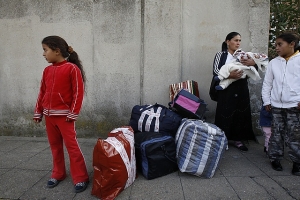France: Renewed Crackdown on Roma
French authorities’ renewed efforts to shut down Roma camps and remove Eastern European Roma from the country raise serious concerns about France’s compliance with its international obligations, Human Rights Watch said today.

A Roma family prepares to leave a camp in Villeneuve d'Ascq, northern France, to go to Lille Airport for their flight to Romania on a voluntary repatriation scheme on September 16, 2010.
In the early morning hours of August 9, 2012, authorities raided two makeshift camps inhabited by Roma in the vicinity of the northern town of Lille, dismantling the camp sites and forcibly evicting residents. The same day, some 240 Romanian Roma, previously evicted from camps in the Lyon area, were flown to Romania on a charter flight.
“This week’s raids appear to be just the latest manifestation of France’s notorious expulsion policy targeting Eastern European Roma,” said Veronika Szente Goldston, Europe and Central Asia advocacy director at Human Rights Watch. “Rather than trying to get rid of unwanted Roma while no one is watching, the government should take a critical look at its sorry record in this area, and act to rectify abuses.”
Officials have justified the operations on the basis that conditions in the camps were “unsanitary” and that “tensions” with the local population had become “untenable.” No alternative accommodation appears to have been provided, leaving some 200 Roma, including 60 children, without homes. In addition to Lille and Lyon, raids on Roma camps were also carried out on the outskirts of Paris earlier in August. The Roma affected by the August 9 raid are believed to be from Romania, and it is expected that authorities will seek to remove them from France.
The 240 Romanian Roma flown to Romania on August 9 left on what authorities said was a voluntary basis, and were paid up to 300 Euro to leave. In the past, many Roma have accepted “voluntary return” only after receiving an order to leave the country. Agreeing to leave voluntarily bypasses any court review of the removals.
France’s treatment of Roma from Eastern Europe came to international spotlight in August 2010, when the government, in a highly publicized campaign, dismantled numerous Roma camps and expelled hundreds of Romanian and Bulgarian Roma. A blatantly discriminatory circular, explicitly singling out Roma camps as a target for evictions and associating these measures with the “immediate expulsion of irregular foreigners,” was leaked to the media.
While the authorities swiftly repealed the circular, extensive research by Human Rights Watch and others in the past two years makes clear that Roma in France remain vulnerable to serial evictions, unfair expulsions, and discrimination.
An immigration law, enacted in June 2011 following criticism by the European Commission, appears to target Eastern European Roma specifically, and falls well short of complying with France’s obligations under European Union rules on freedom of movement and international human rights law, Human Rights Watch said.
The law lists as grounds for expulsion repeated short-term stays in France as well as being in France “for the fundamental purpose” of benefiting from the social assistance system. Human Rights Watch research has shown that authorities around the country commonly expel Roma on a mere presumption that they might one day receive social benefits.
While the law requires authorities to conduct an individual assessment, there are concerns about its application in practice, Human Rights Watch said. In the case of Roma from Eastern Europe, for example, authorities often issue expulsion orders on a large scale in the days leading up to or during evictions from informal camps, without sufficient examination of the individual circumstances of the people there.
Responding to a Human Rights Watch questionnaire in the lead-up to his election in April, President Francois Hollande pledged to “ensure that France is a model of respect for individual freedoms as set forth in the Constitution and the Charter of Fundamental Rights of the European Union,” and called for “discriminatory measures against Roma populations … to be abolished.”
“Hollande’s promises to end discrimination against Roma couldn’t ring more hollow in the wake of this week’s events,” Szente Goldston said. “Rather than embracing its predecessor’s approach, the Hollande government should urgently fix France’s problematic Roma expulsion policy. Reforming the 2011 immigration law is a key step in this regard.”
Source: Human Rights Watch
- 438 reads
Human Rights
Ringing FOWPAL’s Peace Bell for the World:Nobel Peace Prize Laureates’ Visions and Actions

Protecting the World’s Cultural Diversity for a Sustainable Future

The Peace Bell Resonates at the 27th Eurasian Economic Summit

Declaration of World Day of the Power of Hope Endorsed by People in 158 Nations

Puppet Show I International Friendship Day 2020

